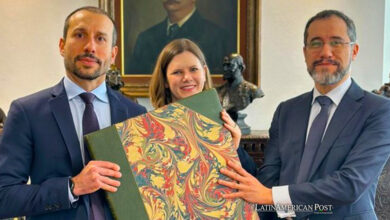Brazil: Supreme Court Sentences Defendant to 17 Years for Bolsonarist Assault in Brasilia
The Supreme Court of Brazil sentenced this Thursday to 17 years in prison the first of those accused for the bolsonarist assault on the headquarters of the three powers that occurred on January 8. The ruling is an example of a polarized country that still wonders if the assault was an attempted coup or a violent demonstration .

Photo: Globe
Eduardo Davis | EFE
Listen to this article
Leer en español: Fallo polarizado en Brasil: Corte Suprema condenda a 17 años a imputado por asalto bolsonarista
The Supreme Court of Brazil sentenced this Thursday to 17 years in prison the first of those accused for the assault on the headquarters of the three powers that occurred on January 8, in the midst of a strong debate that reflected the political polarization that the country is experiencing. .
Aécio Lúcio Costa Pereira, the first of the 1,390 far-right activists accused of this attack against democracy judged by the Supreme Court, was found guilty of illicit association, violent abolition of the democratic rule of law, coup d'état, qualified damages and destruction of assets public.
Although guilt was recognized unanimously, there were strong disagreements among the eleven members of the Supreme Court in relation to the penalty that should be applied and the crimes charged.
However, the proposal of the rapporteur judge, Alexandre de Moraes, was imposed, who suggested 17 years in prison for what he described as a "coup attack" with "irrational hatred", with the "clear objective" of inciting "the Armed Forces to overthrow the legitimate Government" of Luiz Inácio Lula da Silva.
The events occurred eight days after the inauguration of Lula, who in the October elections prevailed over former president Jair Bolsonaro, who did not recognize that result, like the extreme right that supports him and that promoted the January assault.
According to the president of the Supreme Court, Rosa Weber, January 8 was "a Sunday of infamy," when "democracy was attacked by an irrational mob that, with total contempt for public affairs, furiously invaded the heart of the Republic." ".
After that first case, the court plans to try another three of the 1,390 defendants , whose degree of participation must be established in individual processes, since Brazilian law does not contemplate "collective responsibilities."
Read also: Ministers of Economy: "Latin America Has the Potential to be a Source of Solutions"
Thus, there are still 1,389 trials missing, which could be more since the investigation continues and now points to those who financed the movement and the probable intellectual authors, a last case in which there are suspicions about Jair Bolsonaro himself.
Coup attempt or a violent demonstration?
The accusation of "coup d'état" presented by the Prosecutor's Office motivated a strong debate that had on one side the judges André Mendonça and Kassio Nunes Marques, who came to the Supreme Court at the hands of Bolsonaro, and on the other the rest of the nine members of the court.
Both Mendonça and Nunes Marques dismissed that accusation, arguing that the coup was not carried out and that the vandals of January 8 "did not have the strength" to overthrow President Lula.
Mendonça went further and defended some Bolsonarist theses, to affirm that there were "inexplicable" failures in the security area by the Government that "facilitated" the action of the vandals, and to consider that what happened on January 8 should be judged in courts of first instance and not in the highest court.
De Moraes refuted that position with an unusual emphasis in the Supreme Court debates and described the approaches of Mendonça and Nunes Marques as "absurd."
The dean of the court, Gilmar Mendes, also reacted, asking the most conservative judges "not to ignore the context in which the events occurred", preceded by protests at the doors of the barracks that demanded to prevent Lula's inauguration on January 1 , eight days before the events.
"These demonstrations were never seen in democracy," said Mendes, who even cited as a "precedent" a cabinet meeting called by Bolsonaro in March 2021 in which one of his ministers asked to "imprison" all the members of the Supreme Court.
According to Mendes, "it was the same thing that happened in the United States" on January 6, 2022, when far-right activists stormed the Capitol in protest of Joe Biden's electoral victory against Donald Trump.
For political and legal analysts, this debate was nothing more than a reflection of the high political polarization in which the emergence of the Bolsonaro extreme right has plunged the country , to which the Supreme Court is also no stranger.




